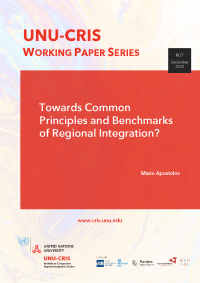Towards Common Principles and Benchmarks of Regional Integration?

This paper seeks to define a list of fundamental principles that outline common advantages for any regional integration entity and can be used as benchmarks to assess progress. Yet we also include critical arguments for each of the six principles to show that there should be strategic thinking in world society, focused on negotiation and agreement for a balanced, multidimensional, constructive, and consensual approach to integration. In this sense, regional integration is (the six principles):
- a project for peace. Describing the European Union, for example, as the greatest peace project in history means that European integration has overcome the legacy of violent conflicts and secured stability for big and small countries. Yet this assumption has come under criticism, as the EU and other entities have engaged in conflictual geopolitical economic and social rivalries.
- a voluntary, pragmatic association of willing states, unlike empires in history. States may join or leave the contemporary integration entities. Yet, from different perspectives, various scholars have raised the point that full-fledged integration entities start behaving like empires.
- increasing efficiency in various dimensions because of the pooling of countries’ resources. Yet interdependence can work both ways: making integration systems more efficient than the sum of their constitutive elements or increasing conflict among them.
- helping less developed members develop faster and converge with the rest of the group. Yet we observe more and more pronounced differences and rising discontent, when developed members see integration as a burden, while less developed ones do not see enough commitment from the rest.
- based on and supporting democracy. Arguably, democracy is a factor producing enduring political stability in a region because of the legitimacy of its political systems. Some regional integration organizations (EU, Mercosur, the African Union) declare allegiance to democracy as part of their remit. Yet this value-laden approach is challenged by the legacy of such organizations as ASEAN or discontent of the ‘democracy deficit’ in top-down entities like the EU.
- providing regional solutions to global challenges, meaning that there is a subsidiarity between the global and regional responses to fundamental issues for humanity. Any global issue should be approached through the lens of the structural specificity of each region, while all of them should be brought together through global collaboration. Yet regional integration solutions can also become the source of problematic fragmentation in the search for solutions to global problems
We live in a rapidly changing world. The wave of regionalism from the 1990s is receding, giving way to scepticism, ‘exits’, de-globalization, the rise of nationalism and violent conflicts. All of these incur a significant cost to society, requiring support for some rational principles of regional integration.
